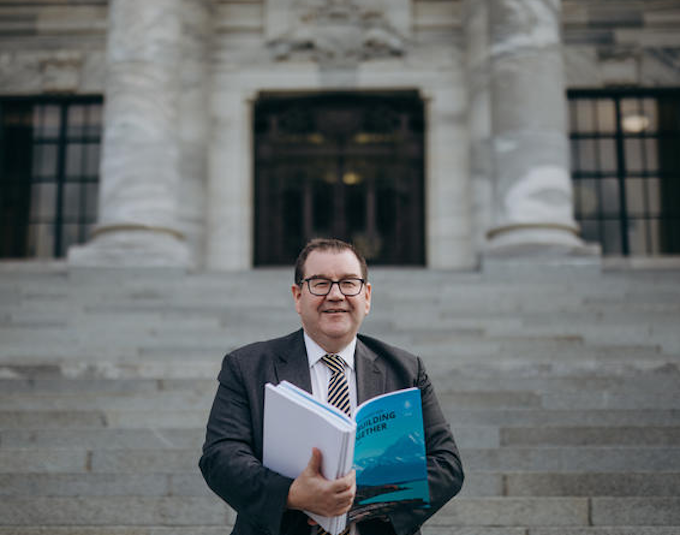
By Craig McCulloch, d
A $50 billion rescue fund sits at the centre of 2020’s “once in a generation Budget” as the country braces for the economic carnage promised by the covid-19 coronavirus pandemic.
The plan lays out the first $15.9 billion of investment including an extension of the wage subsidy scheme to the hardest hit businesses, free trades training, and a state house building programme.
Almost $14 billion has already been allocated to previously-announced initiatives, leaving about $20 billion unspent.
READ MORE: Al Jazeera live updates – US accuses China of coronavirus hacking
- PNG military hand over 3 suspects in killing
- Fiji 33 years after the first fateful coup – a ‘failed democracy’?
The hefty price tag promises to blow out debt to 53.6 percent of Gross Domestic Product (GDP) by 2023 and will leave the country in deficit for years to come.
Finance Minister Grant Robertson said the pandemic was a “one-in-100-year event” which demanded record spending.
“It is a once in a generation Budget. It is bold because the task we face is monumental,” he said.
And Treasury’s forecasts show just how tough that task could be, with unemployment predicted to more than double, surging to a peak 9.8 percent by September this year.
“This is the rainy day we have been preparing for – now we must weather the global storm,” Robertson said.
Support for business
The 12-week wage subsidy scheme – set to expire in June – will be extended by another eight weeks for the worst-hit businesses.
From June 10, firms which can prove their revenue has halved over the previous 30 days compared to the year before will be eligible.
The payment remains at $585 per fulltime worker and will be paid to employers in a lump sum.
Up to $3.2bn has been set aside for the extension.
A $150m short-term loan scheme will also be rolled out to incentivise businesses to continue research and development programmes which might otherwise be shut down.
NZ Trade and Enterprise is set for a $216m boost to increase the number of exporters it can support.
The Budget acknowledges covid-19’s particular toll on the tourism sector with no end in sight for the country’s border closure.
An injection of $400 million will fund a domestic tourism campaign and support businesses to plan their next steps.
A separate $1.1 billion package has been set up with the aim of creating almost 11,000 jobs in the environment sector from pest control to wetland restoration.
Follow RNZ’s liveblog on Budget 2020 here.
Housing and infrastructure
The government has committed to rolling out a home building programme to build 8000 new state houses over the next four to five years.
Kāinga Ora will borrow an estimated $5 billion to pay for the bulk of the houses and the Budget sets aside another $570 million in rent support.
The homes will include about 6000 public houses and 2000 transitional homes.
The Budget also commits an additional $3 billion to fund “shovel-ready” infrastructure projects, on top of the $12 billion spend-up announced earlier this year.
Ministers have already received nearly 2000 applications for funding and will soon decide which projects to push ahead with after receiving advice from officials.
Investment in rail has also been bumped up $1.2 billion to reach $4.6 billion.
Training and eduction
Trades training for critical courses – such as building, construction and agriculture – will be made free for all ages over the next two years to help retrain people who have lost their jobs.
About $1.6 billion has been set aside for the entire Trades and Apprenticeships Training Package which will also help workplaces retain their trainees.
Out of the fund, $276 million will go towards setting up Workforce Development Councils and Skills Leadership Groups to monitor the job market around the country and plan for recovery.
Welfare
The Budget is notably absent of “helicopter cash” initiatives or further significant increases in welfare payments.
In March, the government boosted most benefits by $25 a week. Today’s budget also increases the rates of foster care allowance and orphan’s benefit by the same amount.
Almost $80 million has been committed to social services, of which $32 million will go towards foodbanks and other community food services.
A $36 million fund has also been established to support community groups which support Māori, Pacific, refugee and migrant communities.
Tertiary students will also be able to apply for support from a $20 million hardship fund to help them get through the next few months.
The “Warmer Kiwi Homes” scheme has also been expanded to cover 90 percent of the costs of insulation or heating retrofit for low-income households.
The $56 million investment is expected to cover an extra 9000 houses.
The government is also spending $220 million over two years to grow its current school lunch scheme from 8000 students to about 200,000 by the middle of next year.
- This article is republished by the Pacific Media Centre under a partnership agreement with RNZ.
- If you have symptoms of the coronavirus, call the NZ Covid-19 Healthline on 0800 358 5453 (+64 9 358 5453 for international SIMs) or call your GP – don’t show up at a medical centre.
- Follow RNZ’s coronavirus newsfeed
- Read more about the 2020 Budget













































